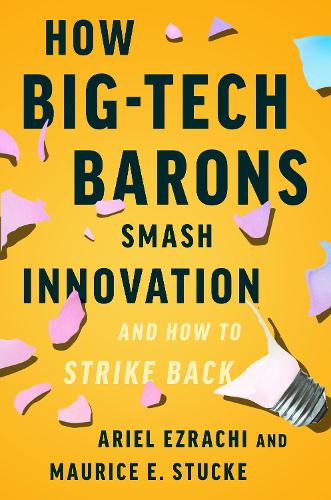
How Big-Tech Barons Smash Innovationand How to Strike Back
(Hardback)
Publishing Details
How Big-Tech Barons Smash Innovationand How to Strike Back
By (Author) Ariel Ezrachi
By (author) Maurice E. Stucke
HarperCollins Publishers Inc
Harper Business
24th November 2022
4th August 2022
United States
Classifications
General
Non Fiction
Business ethics and social responsibility
Development economics and emerging economies
303.483
Physical Properties
Hardback
288
Width 152mm, Height 229mm, Spine 25mm
408g
Description
Two market experts deconstruct the drivers and inhibitors to innovation in the digital economy, explain how large tech companies can stifle disruption, assess the toll of their technologies on our well-being and democracy, and outline policy changes to take poweraway from big tech and return it to entrepreneurs.
Silicon Valleys genius combined with limited corporate regulation promised a new age of technological innovation in which entrepreneurs would create companies that would in turn fuel unprecedented job growth.Yet disruptive innovation has stagnated even as the five leading tech giants, which account for approximately 25 percent of the S&P 500s market capitalization, are expanding to unimaginable scale and power. In How Big-Tech Barons Smash Innovationand How to Strike Back, Ariel Ezrachi and Maurice E. Stucke explain why this is happening and what we can do to reverse it.
While many distrust the Big-Tech Barons, the prevailing belief is that innovation is thriving online. It isnt. Rather than disruptive innovations that create significant value, we are getting technologies that primarily extract value and reduce well-being. Using vivid examples and relying on their work in the field, the authors explain how the leading tech companies design their sprawling ecosystems to extract more profits (while crushing any entrepreneur that poses a threat). As a result, we get less innovation that benefits us and more innovations that surpass the dreams of yesteryears autocracies. The Tech Barons technologies, which seek to decode our emotions and thoughts to better manipulate our behavior, are undermining political stability and democracy while fueling tribalism and hate.
But its not hopeless. The authors reveal that sustained innovation scales with cities not companies, and that we, as a society, should profoundly alter our investment strategy and priorities to certain entrepreneurs (Tech Pirates) and cities infrastructure.
Reviews
[This] remarkable new book should be required reading for everyone at Ofcom, the Competition and Markets Authority and the DCMS. John Naughton, The Guardian In all, it is a strong argument that deserves a good hearing: far from chilling innovation, the book concludes, reining in Big Tech may be the only way to save it. The Financial Times Ariel Ezrachis and Maurice E. Stuckes scholarly research on the digital economy, competition and antitrust law, and economic inequality have made waves in the policy debate space... The digital world has been changing so rapidly, but their proposals for the way forward are promising. Their book is a wide-angle look at where we are, and who and what weas small businesses and everyday internet usersare up against. And if more people read How Big-Tech Barons Smash Innovationand How to Strike Back I think it will enable more fertile ground for truly helpful and humane innovation, online and off. Gabbi Cisneros, Porchlight Using vivid examples and relying on their work in the field, the authors explain how the leading tech companies design their sprawling ecosystems to extract more profits (while crushing any entrepreneur that poses a threat). Porchlight
Author Bio
Ariel Ezrachi is the Slaughter and May Professor of Competition Law and a Fellow of Pembroke College, Oxford. He serves as the Director of the University of Oxford Centre for Competition Law and Policy.
